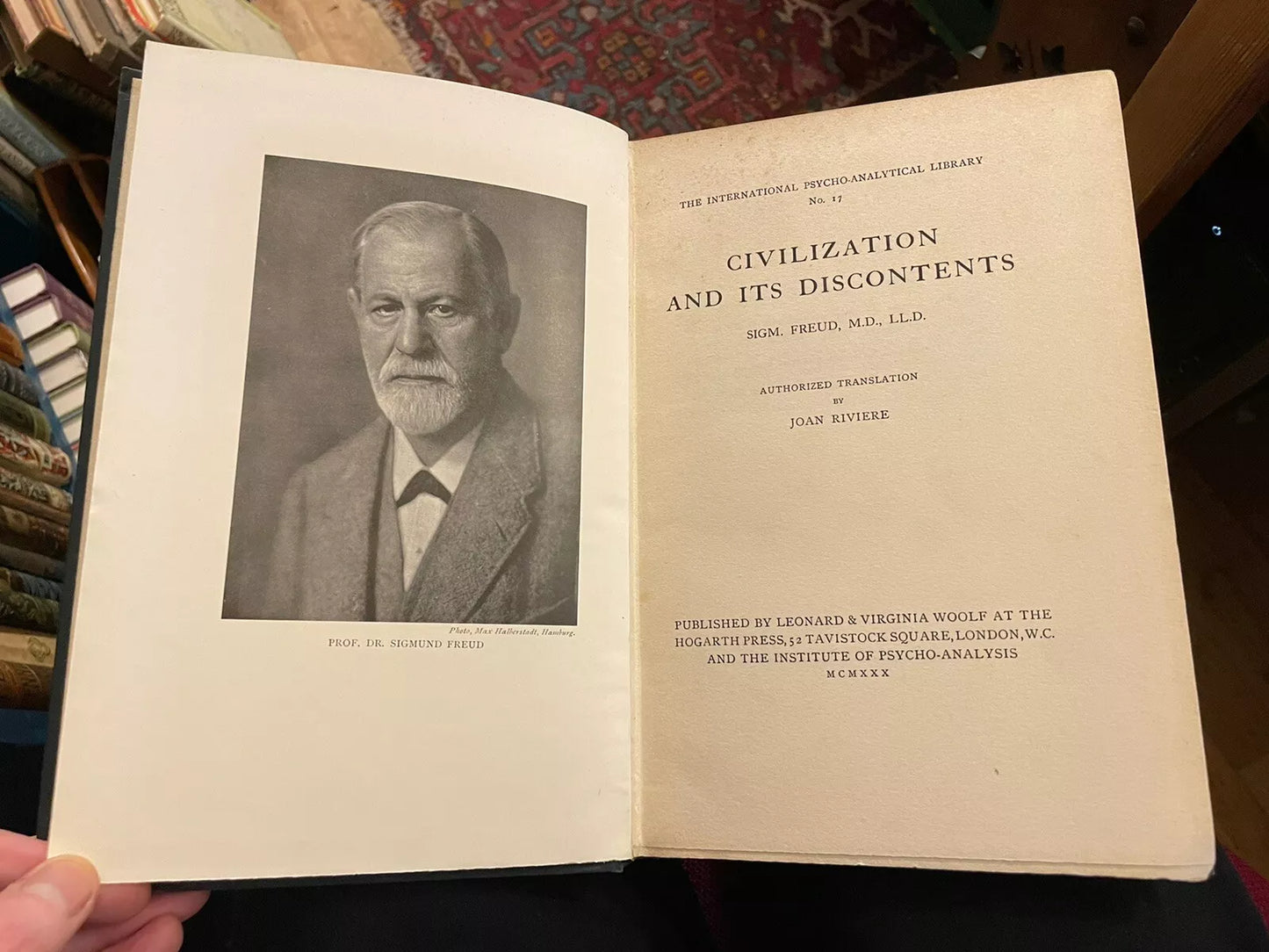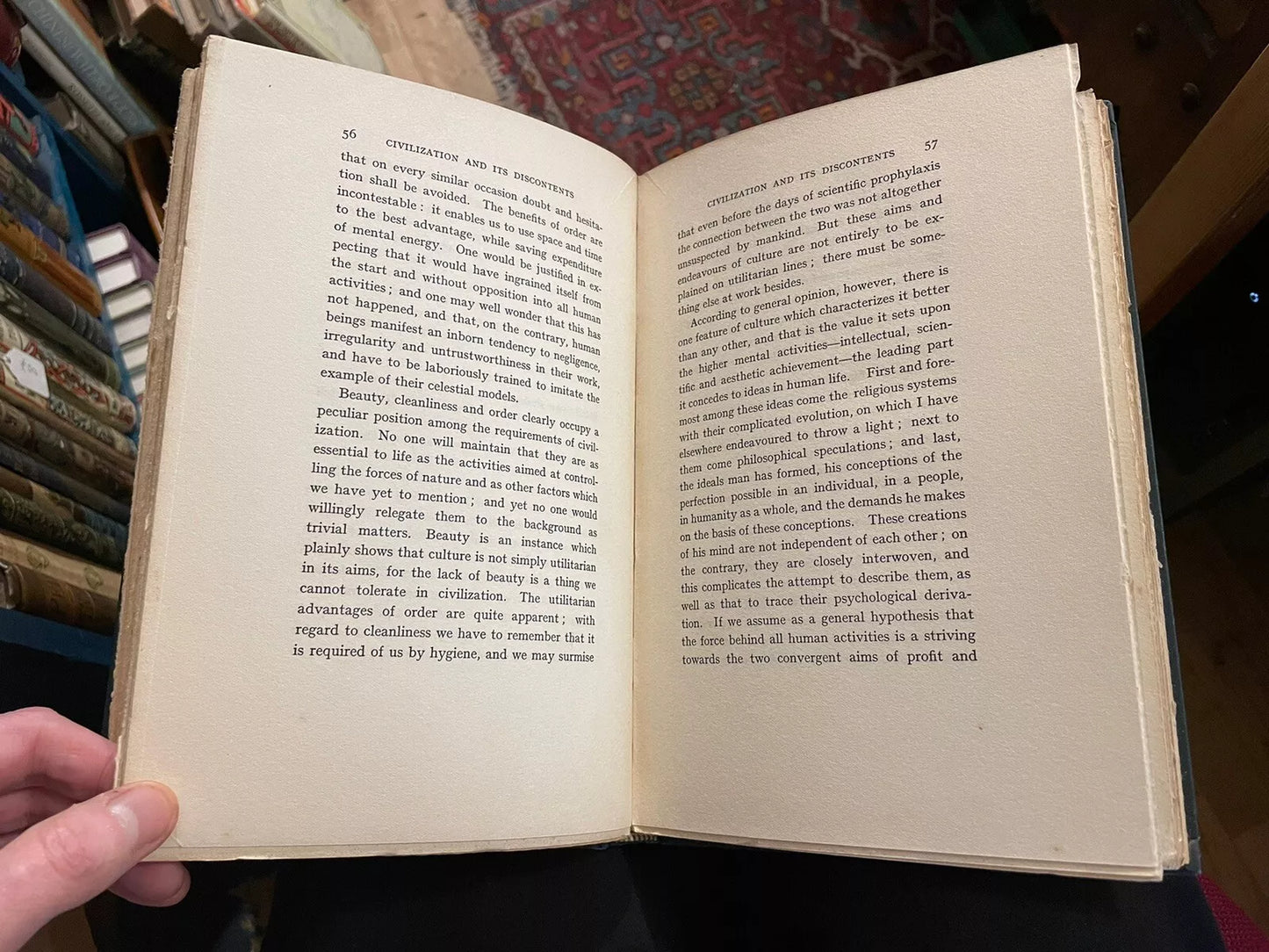The Gently Mad Book Shop
1930 Sigmund Freud : Civilization and its Discontents : First English Edition
1930 Sigmund Freud : Civilization and its Discontents : First English Edition
Couldn't load pickup availability
Civilization and its Discontents
By Sigmund Freud
Published by Leonard and Virginia Woolf at the Hogarth Press, 1930. First English Edition. Hardback, tall 8vo, 144 pages. Portrait frontispiece after the photo by Max Halberstadt.
CONDITION
A good first edition. The cloth binding is good with just a few light scuffs. Endpapers good with a tad of light spotting. All contents present and pages in good clean condition throughout and free from foxing, stains, etc. No writing or names to the book. Overall a good first edition.
Civilization and its Discontents is a seminal text in the field of psychology, written by Austrian psychologist (and founder of psychoanalysis) Sigmund Freud, published in 1930. The book comprises eight chapters.
In the first chapter, Freud discusses an "oceanic" feeling that he locates as the source of religious energy. According to a former acquaintance of Freud's (a poet), experiencing this "oceanic" feeling of "otherness" is sufficient to call oneself religious in the absence of one's affiliation with organized religion. Also in this chapter, Freud discusses the difference between the superego (which controls human behavior), ego (which determines how human's make decisions and behave among one another in practical affairs) and the id (which represents subconscious desires). Freud suggests that as an individual ages, they must reconcile their internal self with the external world.
In the second chapter, Freud both remarks that religion is at odds with Western society's high achievements in the arts and sciences, as the latter is a product of mature thinking, the former of infantile helplessness. Freud also describes pleasure as discernible only by the absence of pain.
In the third chapter discusses happiness and unhappiness. Freud says that unhappiness can be caused by the "superior power of nature" (ch. 3), the limitations of the human body, and human relationships. Freud also remarks on the futility of trying to measure such an abstract concept as human happiness.
In chapter 4, Freud introduces what he perceives as two types of love: sexual love and family love. The latter, he concludes is an inhibited form of former. Freud also comments that the family unit and union between a man and women is actually rooted in sexuality and basic needs (i.e., it was more expedient for a man to have a women to provide certain needs while the man provided others).
Chapter 5 discusses the concept of Christian love, specifically the injunction to love one's neighbor and enemy. Freud argues that to love these people is not only inefficient, but renders the concept of love meaningless. On the contrary, one should be aggressive to one's neighbors.
In chapter 6, Freud introduces the idea of a death instinct in addition to the love instinct. The instinct to love holds individuals together in a society, while the death instinct seeks to cause self-inflicted harm and dissolve societal units.
Chapter 7 discusses the superego at great length. Freud claims that the superego is especially active in virtuous people, who are constantly seeking to improve their own flaws. The superego's moral compass is supplied by one's experience with parental authority.
Chapter 8 posits the idea that societies evolve as children do. Therefore, mature societies have a more developed and active superego that can govern itself. Freud also contends that civilizations produce guilt in individuals, which is a form of aggression focused inward. Man has conquered nature, Freud notes, and so now will naturally focus on Eros (the love instinct), and it is not clear whether mankind will be successful.
(Desk : Top Shelf, middle right)
Share with someone
















